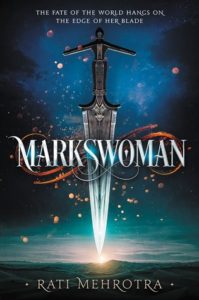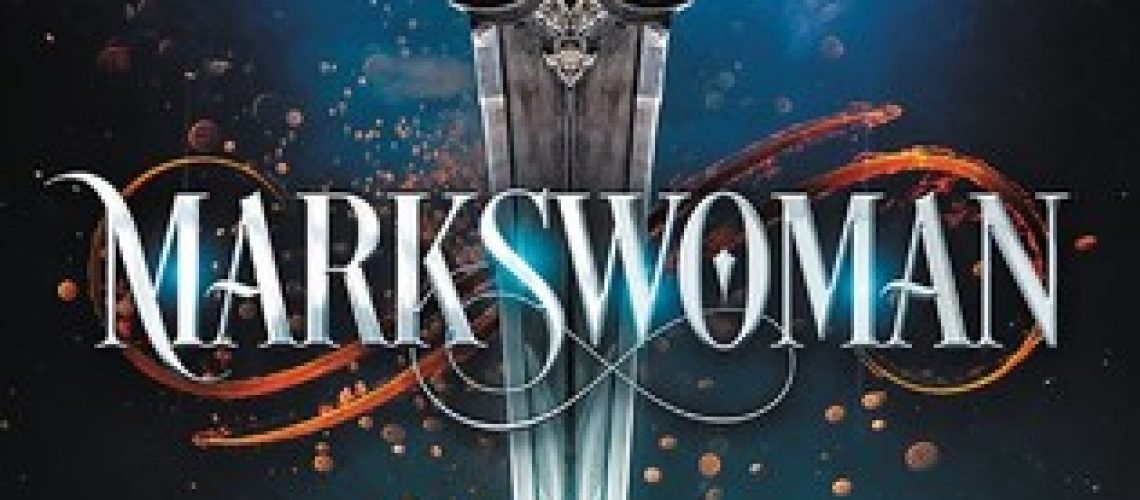Orders of female warriors, psychic weapons and quests for revenge are at the centre of Rati Mehrotra’s debut novel Markswoman.
Nearly a thousand years after an apocalypse, humanity lives on in clans, and executions are carried out by orders of elite warriors. Kyra belongs to the oldest of these orders: the Order of Kali. Their leader, Shirin Mam, is renowned for her wisdom and power. Things begin to go wrong when Kyra returns one day to discover Shirin Mam is dead. Although the death appears natural, Kyra is convinced her mentor has been murdered… and she’s pretty sure she knows the culprit. It is up to her to claim justice.

The story is told in close third person, primarily from two perspectives. Kyra is the sole survivor of her clan’s massacre. She was found and taken in by the Order of Kali. She burns to enact vengeance upon those responsible for her family’s death, but Shirin Mam is understandably reluctant to allow Kyra to pursue that path. Kyra is a character with flaws. She’s resentful and petty, taking delight in humiliating an apprentice with whom she has a feud. She clings to her desire for revenge, unsatisfied by the not-so-small vengeance her mentor allows her to take. However, she’s loyal to her friends and mentor. She also listens to Shirin Mam, even when she doesn’t agree or understand what she’s being taught. She faces things with courage. Although I found her irritating from time to time, she’s generally a pretty likeable character.
The second perspective comes from a young warrior called Rustan. He belongs to the Order of Khur, the sole order composed of men. Things went wrong during the execution of his last mark, leaving him with a desire to atone. He finds that chance when he meets Kyra. As a character, Rustan is less developed than Kyra. He tends toward the brooding, lone-wolf type, though, like Kyra, he listens to and respects his mentor.
While there is a lot of chatter indicating this book is about female assassins, that doesn’t adequately depict the role of Markswomen. They are dispensers of justice and while this sometimes entails assassination, just as often they come to openly execute. It’s also worth noting that fewer marks are killed on screen than one might expect, so readers going into the book expecting lots of focus on assassination will be disappointed. The Markswomen are their own kind of warriors, rather than rehashing the ninjas or samurai one might expect from an Asian-influenced setting. In fact, despite the region’s name of Asiana, the presence of Kali, and the predominantly POC cast, any Asian influence comes with a light touch (at least to my admittedly non-Asian eyes). Instead, these details become nods to the post-apocalyptic nature of the setting.
However, the novel does engage with a common theme in tales about warriors. Both Kyra and Rustan wrestle with what it means to take a life, albeit in slightly different iterations. This dovetails into the theme of revenge. From the very first scene, readers are reminded that vengeance isn’t something to be glorified but something that comes at a price. And it is different from justice, as the narrative also shows.
Sexism is dealt with by inversion. Rustan’s order is the only one comprised of men. They are generally looked down upon by the other orders, some of whom perceive them as a perversion of the natural order. It is accepted wisdom that only women can truly bond with the psychic katari daggers that make a Markswoman or Marksman. Kyra is influenced by this thinking—though not as strongly as some of the other characters—and it is a delight to see her confront this after spending some time with the Order of Khur.
The story suffers from some flaws. There are some clumsy info dumps, particularly in the beginning. Guns are also present in the world and presented in a way that lacks nuance. Standing in dichotomy with the Markswomen’s psychic daggers, they’re basically made of the same psychic metal, but evil. While I’m not by any means a proponent of guns (rather the opposite, in fact), this simplistic setup was hard to take seriously and seemed a wasted opportunity that I hope will be rectified in the next book.
Pacing is also a key problem. The opening is slow. Some of it is necessary setup, but other parts feel like they could have been scaled back. Although Kyra’s interactions with her friends give us some sense of who she is, the parts of the plot involving these characters could be cut without losing anything essential. I can only surmise that they have some significance for the sequel.
The pace only really begins to pick up once Kyra and Rustan meet. Their situation is briefly established before readers are catapulted forward a month to find Kyra and Rustan wrestling with their mutual attraction. This makes their relationship feel a bit instalove because even though time has passed for the characters, it hasn’t for the reader. We’ve missed seeing the moments leading up to this point, the moments which make their attraction convincing.
Despite this uneven pace, it picks up at the end, drawing all the threads together into a compelling climax that had me hooked all the way up to the abrupt ending.
Markswoman is very much a debut novel but one that pushes back against racist and sexist stereotypes.








One Response